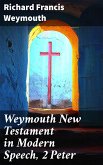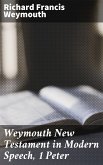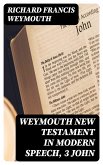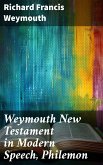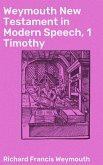Richard Francis Weymouth's "Weymouth New Testament in Modern Speech, 1 Peter" is a groundbreaking translation that breathes contemporary life into the Epistle of 1 Peter, making it accessible to modern readers. Weymouth's literary style is characterized by clarity and simplicity, eschewing archaic language in favor of vernacular English. This translation situates itself within the context of early 20th-century biblical scholarship, aiming to bridge the gap between traditional biblical texts and modern vernacular language, enabling a deeper understanding of the epistle's theological nuances and pastoral implications. Weymouth, a noted scholar and linguist, was motivated by a desire to democratize access to biblical texts, reflecting the era's push for modernity in interpretation. His academic background in classical languages and his commitment to clarity were critical in shaping this work. By translating 1 Peter, Weymouth not only aimed to convey its message effectively but also sought to inspire faith and resilience among contemporary Christians facing socio-cultural challenges. This edition of 1 Peter is highly recommended for both academic and casual readers who wish to explore the text's themes of suffering, identity, and hope through a lens that resonates with today's context. Weymouth's translation serves as an invaluable resource for understanding the enduring relevance of early Christian teachings.
Dieser Download kann aus rechtlichen Gründen nur mit Rechnungsadresse in A, B, BG, CY, CZ, D, DK, EW, E, FIN, F, GR, H, IRL, I, LT, L, LR, M, NL, PL, P, R, S, SLO, SK ausgeliefert werden.



